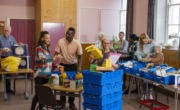Family Action’s services working with Special Educational Needs and Disabilities (SEND) know there is no such thing as a “typical” child or young person, and we tailor our support to the challenges and strengths of those we work with. This is how our Small Steps service supported Robbie, who has a diagnosis of ADHD, and his family.
Robbie was 13 years old when he was referred to Small Steps by his Paediatrician for support around emotional health, parental advice and support. Robbie lived at home with his mum Helen and three stepsiblings but his relationship with his mother was turbulent. This relationship was put under further strain as he hadn’t seen his father since he was a small child, and has no contact with his stepfather, who left the home a couple of years ago, leaving him without a male role model in the home.
School was also difficult for Robbie despite staff trying to support him through one-to-one support, homework clubs and time out from lessons, and he had faced several exclusions. In addition, medication was not effective as Robbie was unable to eat enough to make it work correctly, and he didn’t engage with Child and Adolescent Medical Health Services (CAMHS) or the youth offending team, who had approached him following threatening behaviour and public damage in the community.
Family Action’s Small Steps service visited both his home and the home of his grandmother, who had a positive relationship with him, to identify what was working and draft a support plan for the family. A Small Steps team worker worked with Helen on routines, relationships and activities to ensure Robbie gets one-to-one time with her where they can promote positive behaviour, and we also monitored her wellbeing to ensure that she looked after herself too.
“We aimed to provide a role model who could engage with Robbie through activity rather than sit-down support and encourage involvement in a hobby which would offer a means of keeping active in a positive way in the future.”
For Robbie, we arranged two active support sessions with a male support worker. By doing so we aimed to provide a role model who could engage with Robbie through activity rather than sit-down support and encourage involvement in a hobby which would offer a means of keeping active in a positive way in the future.
This strategy worked and, through these sessions, we were able to engage Robbie and discuss topics such as school, friendships, anger and family relationships.
He also improved his communication in the home through strategies unique to him, such as writing messages on the kitchen blackboard, and his outbursts have become less severe. Helen too has also seen benefits from working with Small Steps, saying she feels stronger. She is seeking counselling support for her own wellbeing and is having sessions with a Family Action befriender so she feels less isolated.
The result is that their relationship has improved, with the pair marking out time to spend together based around activities such as film nights, swimming and trips out.
Robbie is now looking towards the future, and the family are discussing relevant support for his GSCEs, potential counselling support and football coaching sessions to develop his interest in the game.
Our Small Steps service provides early support and evidence-based interventions to families of children and young people displaying behaviour that causes concern or challenges. We do this for families both with and without a formal diagnosis of ASD or ADHD. Find out more.
Small Steps is one of a range of Family Action SEND services. Family Action is committed to helping build a more holistic approach to SEND provision nationally that works with and for whole families to secure the best outcomes for their children. You can read our response the recent government SEND and Alternative Provision Improvement Plan here.







